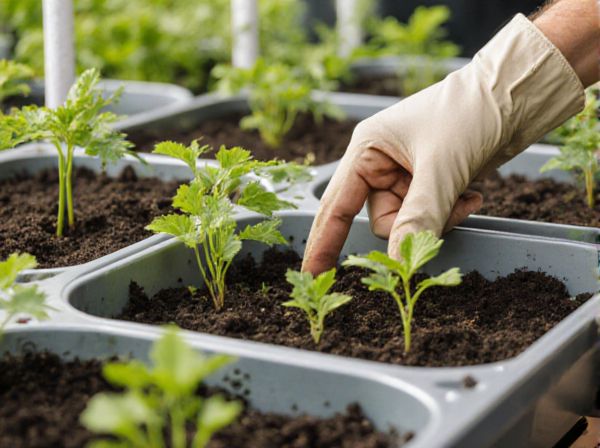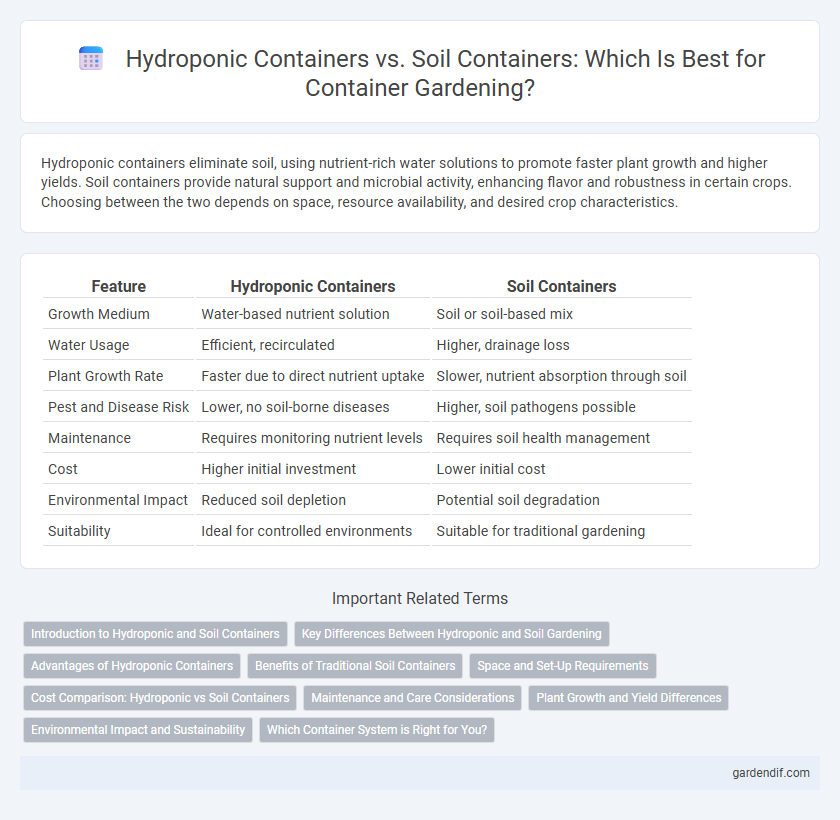
Hydroponic containers vs Soil containers Illustration
Hydroponic containers eliminate soil, using nutrient-rich water solutions to promote faster plant growth and higher yields. Soil containers provide natural support and microbial activity, enhancing flavor and robustness in certain crops. Choosing between the two depends on space, resource availability, and desired crop characteristics.
Table of Comparison
| Feature | Hydroponic Containers | Soil Containers |
|---|---|---|
| Growth Medium | Water-based nutrient solution | Soil or soil-based mix |
| Water Usage | Efficient, recirculated | Higher, drainage loss |
| Plant Growth Rate | Faster due to direct nutrient uptake | Slower, nutrient absorption through soil |
| Pest and Disease Risk | Lower, no soil-borne diseases | Higher, soil pathogens possible |
| Maintenance | Requires monitoring nutrient levels | Requires soil health management |
| Cost | Higher initial investment | Lower initial cost |
| Environmental Impact | Reduced soil depletion | Potential soil degradation |
| Suitability | Ideal for controlled environments | Suitable for traditional gardening |
Introduction to Hydroponic and Soil Containers
Hydroponic containers use nutrient-rich water solutions to grow plants without soil, enabling faster growth and higher yields by delivering nutrients directly to roots. Soil containers rely on traditional soil mediums that provide natural nutrients and support beneficial microbial activity essential for plant health. Choosing between hydroponic and soil containers depends on factors like space, resource availability, and crop type, making hydroponics ideal for controlled environments and soil containers preferred for organic gardening.
Key Differences Between Hydroponic and Soil Gardening
Hydroponic containers use nutrient-rich water solutions instead of soil, enabling faster plant growth and higher yields due to direct nutrient absorption. Soil containers rely on natural soil, which provides microorganisms and organic matter that support plant health but may slow nutrient uptake. Hydroponic systems require precise control of pH and nutrient concentration, while soil gardening depends on soil quality and natural processes for nutrient availability.
Advantages of Hydroponic Containers
Hydroponic containers offer superior water efficiency by delivering nutrients directly to plant roots, reducing water waste compared to traditional soil containers. These containers enable faster plant growth due to optimized oxygen and nutrient availability, resulting in higher yields within a shorter time frame. They also minimize soil-borne diseases and pest issues, promoting cleaner and healthier crop production.
Benefits of Traditional Soil Containers
Traditional soil containers provide natural nutrient-rich environments that support diverse microbial activity essential for healthy plant growth. These containers offer improved water retention and aeration, helping roots to establish stronger structures compared to hydroponic systems. The use of soil containers also reduces dependency on specialized equipment, making them cost-effective and accessible for gardeners of all skill levels.
Space and Set-Up Requirements
Hydroponic containers require less space than traditional soil containers due to their compact design and vertical growth potential, making them ideal for limited areas. They demand a more controlled setup, including reservoirs, pumps, and nutrient solutions, whereas soil containers primarily need potting soil and drainage provisions. Efficient use of space in hydroponics enables higher plant density and faster growth cycles compared to conventional soil-based systems.
Cost Comparison: Hydroponic vs Soil Containers
Hydroponic containers typically have higher upfront costs due to the need for specialized materials and equipment designed to support nutrient-rich water systems, while soil containers are generally more affordable initially, relying on readily available pots and soil. Over time, hydroponic systems can reduce costs associated with water usage and fertilizer, leading to potential savings despite the initial investment. Maintenance expenses for hydroponic containers may be lower due to controlled environments that reduce pest and disease damage compared to traditional soil containers.
Maintenance and Care Considerations
Hydroponic containers require consistent monitoring of nutrient solution levels and pH balance to prevent buildup of salts and algae, ensuring optimal plant growth. Soil containers demand regular watering, soil aeration, and prevention of pest infestations to maintain healthy root systems. Both container types benefit from periodic cleaning to reduce disease risks and improve longevity.
Plant Growth and Yield Differences
Hydroponic containers deliver nutrients directly to plant roots via a water-based solution, resulting in faster growth rates and higher yields compared to traditional soil containers. Plants grown in hydroponic systems often exhibit enhanced nutrient uptake efficiency and reduced risk of soil-borne diseases, which contribute to improved overall plant health and productivity. In contrast, soil containers may provide more natural growing conditions but typically require longer growth periods and can produce lower yields due to variable nutrient availability and soil quality.
Environmental Impact and Sustainability
Hydroponic containers significantly reduce water usage by up to 90% compared to traditional soil containers, minimizing environmental strain and promoting sustainable agriculture. These systems eliminate soil erosion and reduce the need for chemical fertilizers, directly lowering the carbon footprint associated with crop production. By optimizing resource efficiency and enabling controlled environment agriculture, hydroponic containers support long-term ecological balance and sustainable food systems.
Which Container System is Right for You?
Hydroponic containers offer precise nutrient control and faster plant growth, making them ideal for growers seeking efficient space use and reduced water consumption. Soil containers provide natural microbial activity and better buffer against nutrient imbalances, suited for those preferring traditional gardening with less technical maintenance. Choose hydroponic systems for scalable, soilless cultivation, while soil containers benefit gardeners focused on organic soil health and ease of use.
Hydroponic containers vs Soil containers Infographic

 gardendif.com
gardendif.com